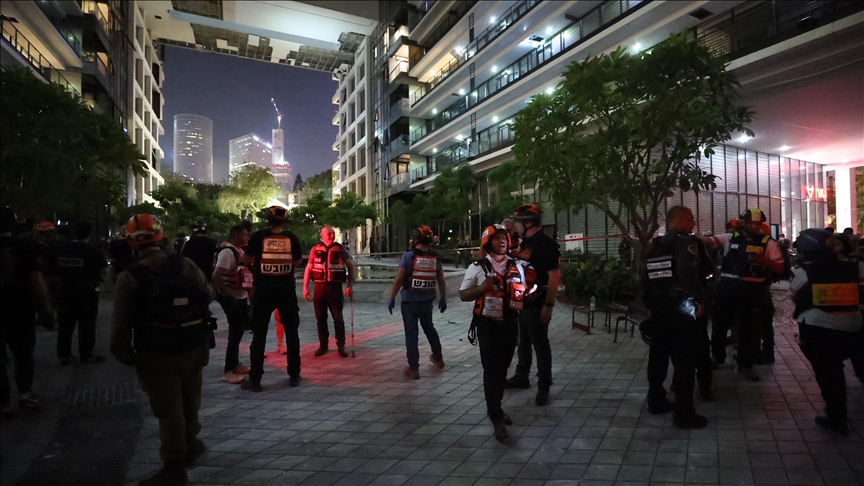Arab leaders urge de-escalation following Israeli strikes on Iran
Governments across Arab world call for diplomatic solutions and regional calm after Israeli airstrikes target Iranian nuclear sites and top officials

ISTANBUL
Arab states stepped up diplomatic efforts Friday to prevent further regional escalation after Israel launched large-scale military strikes against Iran, according to official statements by Saudi Arbai, Qatar, Egypt, Jordan, Kuwait, Iraq and Palestine.
The campaign, dubbed “Rising Lion” by Israeli officials, involved more than 200 fighter jets and targeted nuclear facilities and high-ranking military figures across multiple regions in Iran. In retaliation, Iran fired ballistic missiles toward Tel Aviv.
Saudi Arabia
Saudi Crown Prince Mohammed bin Salman spoke by phone Friday evening with US President Donald Trump to discuss the Israeli strikes. According to the Saudi Press Agency, both leaders emphasized the need for restraint, de-escalation, and resolving disputes through diplomacy.
Separately, Saudi Foreign Minister Prince Faisal bin Farhan called his Iranian counterpart Abbas Araghchi, condemning the Israeli attack as “blatant” and a setback to regional de-escalation efforts, the Saudi Foreign Ministry said.
Prince Faisal also held calls with Egyptian Foreign Minister Badr Abdelatty and Jordanian Foreign Minister Ayman Safadi to discuss the Israeli strikes and coordinated efforts to ease regional tensions.
He later spoke with Norwegian Foreign Minister Espen Barth Eide about developments in the Middle East, the ministry added.
Qatar
Qatari Prime Minister and Foreign Minister Mohammed bin Abdulrahman held separate phone calls with his counterparts in Saudi Arabia, Egypt, Oman, and Jordan, according to statements from the Qatari Foreign Ministry.
He expressed “deep concern” over what he called a dangerous escalation that threatens regional security and undermines diplomatic efforts to resolve outstanding issues peacefully.
In a separate call with Iranian Foreign Minister Araghchi, bin Abdulrahman condemned the Israeli strikes and pledged that Qatar would work with regional and international partners to urgently stop the attack and prevent its consequences from destabilizing the region.
United Arab Emirates
UAE Foreign Minister Abdullah bin Zayed held phone calls with his counterparts in Qatar, Oman, France, the UK, and Russia. The discussions focused on the Israeli strikes and ways to boost international efforts toward diplomatic solutions.
Oman
Omani Sultan Haitham bin Tariq received a phone call from Italian Prime Minister Giorgia Meloni. The leaders discussed escalating tensions in the region and shared views on promoting calm and stability.
Egypt
The Egyptian Foreign Ministry said Abdelatty spoke with Qatari and Iranian counterparts about the regional fallout from the Israeli strikes.
He stressed Egypt’s rejection of any violations of national sovereignty and called for concerted efforts to avoid widespread conflict. He warned of the risks of regional chaos if tensions continue to escalate.
Jordan
Jordan’s King Abdullah II spoke by phone with Italian Prime Minister Meloni and warned that the escalation poses a serious threat to regional security. He urged the international community to intervene and halt the conflict.
Foreign Minister Ayman Safadi echoed the king’s concerns in a call with Iran’s Araghchi, warning that a broader regional war would jeopardize both regional and global peace.
Safadi reiterated Jordan’s condemnation of the Israeli strikes and stressed the country would not tolerate any violations of its sovereignty by either Israel or Iran. “Jordan will not be a battlefield and will confront any airspace violations,” he said.
Kuwait
Kuwaiti Foreign Minister Abdullah al-Yahya held talks with his Saudi and Iranian counterparts. The Kuwaiti Foreign Ministry said al-Yahya expressed solidarity with Iran in light of the Israeli attack and rejected all forms of violence and escalation.
He emphasized the importance of intensified diplomatic and political efforts to maintain regional security in a call with Araghchi.
Iraq
Iraqi Foreign Minister Fuad Hussein told Araghchi in a phone call that Iraq has filed an official complaint to the UN Security Council over Israeli violations of its airspace, which were used to conduct the strikes.
The Iraqi Foreign Ministry demanded that the Security Council hold Israel accountable and ensure Iraq’s sovereignty is respected.
Palestine
Palestine’s Vice President Hussein al-Sheikh said on X that he held separate calls with the foreign ministers of Saudi Arabia, Jordan, and Egypt to discuss the ongoing crisis and its broader implications for the Middle East.








